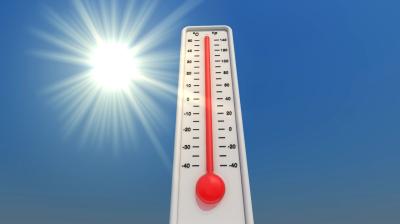
Climate change
Climate change is the term used to describe changes in the state of the climate that can be identified by changes in the average and/or the variability of its properties and that persists for an extended period, typically decades or longer.
Overview
Climate change may be due to natural internal processes or external forcings such as modulations of the solar cycles, volcanic eruptions and persistent human-induced changes in the composition of the atmosphere, ocean or in land use.
“Anthropogenic” or “human-induced climate change” results from human activities which are already affecting many weather and climate extremes in every region across the globe. These can include:
• burning of fossil fuels,
• deforestation,
• land use and land use changes,
• livestock management,
• fertilisation,
• waste management, and
• industrial processes.
According to IPCC’s Sixth Assessment Report, human activities, principally through emissions of greenhouse gases, have unequivocally caused global warming. The 10-year average global surface temperature for 2011-2020 is estimated to be 1.1 °C above the 1850-1900 pre-industrial baseline (IPCC AR6 Synthesis Report).
Human-induced climate change has led to widespread and rapid changes in the atmosphere, ocean, cryosphere and biosphere, affecting many weather and climate extremes in every region across the globe and causing widespread adverse impacts and related losses and damages to nature and people.
Global greenhouse gas emissions have continued to increase, with unequal historical and ongoing contributions arising from unsustainable energy use, land use and land-use change, lifestyles and patterns of consumption and production across regions, between and within countries, and among individuals. Only with deep, rapid and sustained reductions in greenhouse gas emissions can we limit the temperature increases and avoid the worst impacts of climate change. (Source: IPCC Synthesis Report).
Impact
Widespread and rapid changes in the atmosphere, ocean, cryosphere and biosphere have occurred.
Human-caused climate change is already affecting many weather and climate extremes in every region across the globe. This has led to widespread adverse impacts and related losses and damages to nature and people (IPCC AR6 Synthesis Report SPM). For example, the changing state of our glaciers has caused significant sea level rise.
Risks and projected adverse impacts and related losses and damages from climate change escalate with every increment of global warming. Climatic and non-climatic risks will increasingly interact, creating compound and cascading risks that are more complex and difficult to manage. For example, increased air pollution from burning fossil fuels can worsen the impact of natural disasters like heat waves and droughts on human health.
Constraining global warming to 1.5°C, rather than to 2°C and higher, is projected to have many benefits for terrestrial and wetland ecosystems and for the preservation of their services to humans.
WMO's response
WMO and the United Nations Environment Programme jointly set up the Intergovernmental Panel on Climate Change (IPCC) in 1988 to provide governments at all levels with scientific information that they can use to develop climate policies. IPCC reports are also a key input into international climate change negotiations. The IPCC is a body made up of governments that are members of the United Nations or WMO.
WMO also works in partnership and collaboration with Members and organizations worldwide to coordinate studies of the climate, its variations and extremes and impact on human activities, as well as coordinating development and use of climate services as an essential component of climate action.
Together, we work to understand the influence of climate change on human health, safety, and welfare, so that countries and communities around the world can make evidence-based decisions to mitigate and adapt to its impacts.











